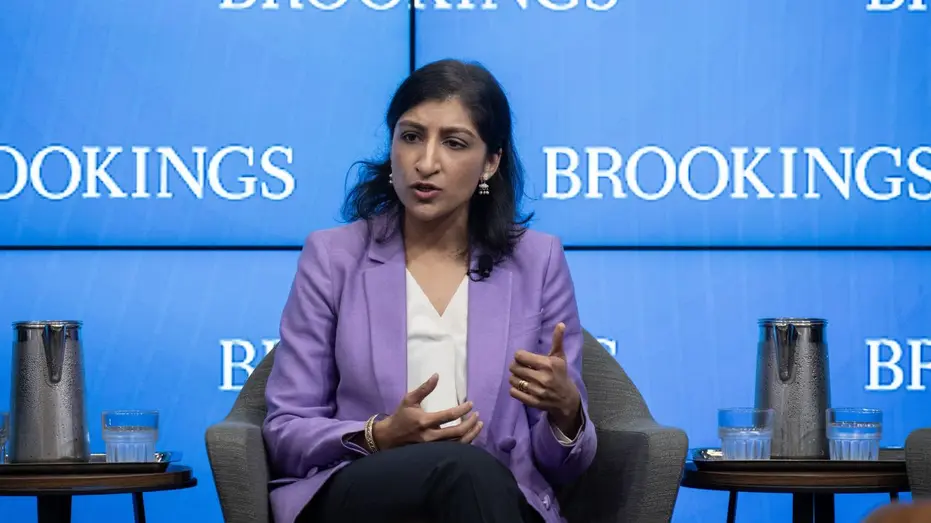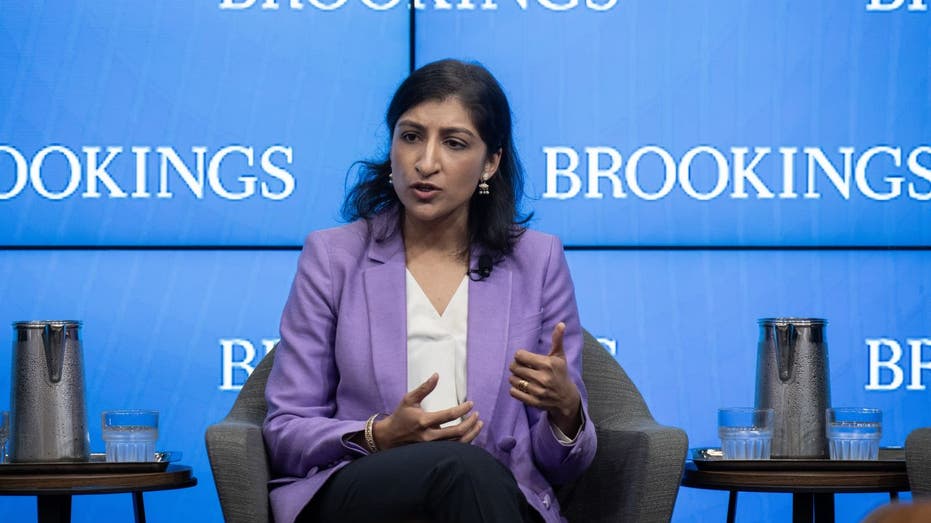Rep. Pat Fallon, R-Texas, discusses how border security is a key issue for voters, the partisanship from FTC Chair Lina Khan and the Biden-Harris administrations foreign policy.
Exclusive: Republican lawmakers in Congress are stepping up oversight of how the Federal Trade Commission (FTC) and the agency’s chair, Lina Khan, scrutinized a pair of high-profile energy sector mergers, arguing the regulator was favoring a political agenda over genuine competitive concerns.
House Judiciary Committee Chair Jim Jordan, R-Ohio, and Sen. Mike Lee, R-Utah, ranking member of the Senate Judiciary Subcommittee on Competition Policy, Antitrust and Consumer Rights, on Monday sent a letter to Khan and the FTC. The letter, which was reviewed by FOX Business, raised concerns related to the agency’s use of settlement agreements that aren’t related to the competitive effects of pending mergers.
“Recent cases suggest that the FTC under your leadership is pursuing settlements not because there is harm to competition, but due to political pressure from Democrats in Congress,” Jordan and Lee wrote to Khan.
“Specifically, the FTC has entered into consent decrees in the Exxon/Pioneer and Chevron/Hess mergers, though neither merger warranted a settlement under the Clayton Act. This abuse of the settlement process reinforces serious concerns about your politicization of the FTC and the practice of fabricating favorable precedent through settlement agreements,” they said, requesting further information about the use of consent decrees.
SCHUMER, DEMOCRATS CALL FOR FTC PROBE OF EXXON, CHEVRON ACQUISITIONS

FTC Chair Lina Khan has taken an aggressive approach to challenging proposed mergers and acquisitions. (Drew Angerer / Getty Images)
The letter said the FTC’s consent decrees are used to settle claims of wrongdoing and impose requirements on a company when the agency “has reason to believe” the party to the consent decree has violated antitrust.
| Ticker | Security | Last | Change | Change % |
|---|---|---|---|---|
| CVX | CHEVRON CORP. | 160.78 | +0.99 | +0.62% |
| XOM | EXXON MOBIL CORP. | 120.33 | +0.98 | +0.82% |
However, in the case of the Exxon-Pioneer and Chevron-Hess mergers, the FTC “had no reason to believe the proposed transactions would harm competition,” Jordan and Lee wrote.
“Instead, the FTC appears to have pursued consent decrees after Democrats in Congress raised generalized, far-left policy concerns about mergers in the energy industry. In these consent decrees, the FTC forced a restructuring of the companies’ leadership, smeared the companies’ executives, and prevented certain individuals from remaining on the boards of the acquiring companies,” they continued.
CHEVRON TO ACQUIRE HESS IN $53 BILLION DEAL

Chevron’s effort to acquire Hess Corp. drew FTC scrutiny. (David Paul Morris/Bloomberg via / Getty Images)
“To be clear, these consent decrees by the FTC are not competition remedies to correct for merger specific harms – the FTC’s actions are only a headline-grabbing tactic that targets disfavored entities and placates political allies. These merger did not present any anitcompetitive concerns, thus the FTC’s consent decrees are unwarranted and did nothing to enforce the Clayton Act or protect consumers from anticompetitive harm.”
The letter requests the FTC provide documents and communications related to the consent decrees covering ExxonMobil’s acquisition of Pioneer and Chevron’s acquisition of Hess, as well as a briefing about the FTC’s use of enforcement authority to restrict individuals from serving on corporate boards following the acquisitions in question.
FTC INVESTIGATES EXXON’S $60 BILLION DEAL FOR PIONEER

ExxonMobil acquired Pioneer Natural Resources. (Brandon Bell / Getty Images)
ExxonMobil completed its acquisition of Pioneer Natural Resources in early May 2024. The FTC’s consent order prevented Pioneer founder and CEO Scott Sheffield from serving on Exxon’s board or working for the company in an advisory role. The FTC’s consent order sought to bar Sheffield from engaging in what the agency called “collusive activity that would potentially raise crude oil prices.”
Chevron’s acquisition of Hess was cleared through the FTC’s antitrust review process at the end of September this year, after the FTC banned Hess CEO John Hess from serving on the Chevron board over concerns he would align Chevron’s production with OPEC’s output decisions to maintain higher oil prices. He will instead serve as an adviser to Chevron on government relations and social investments in Guyana and the Salk Institute’s Harnessing Plants Initiative.
GET FOX BUSINESS ON THE GO BY CLICKING HERE
The FTC declined to comment on the lawmakers’ letter.
